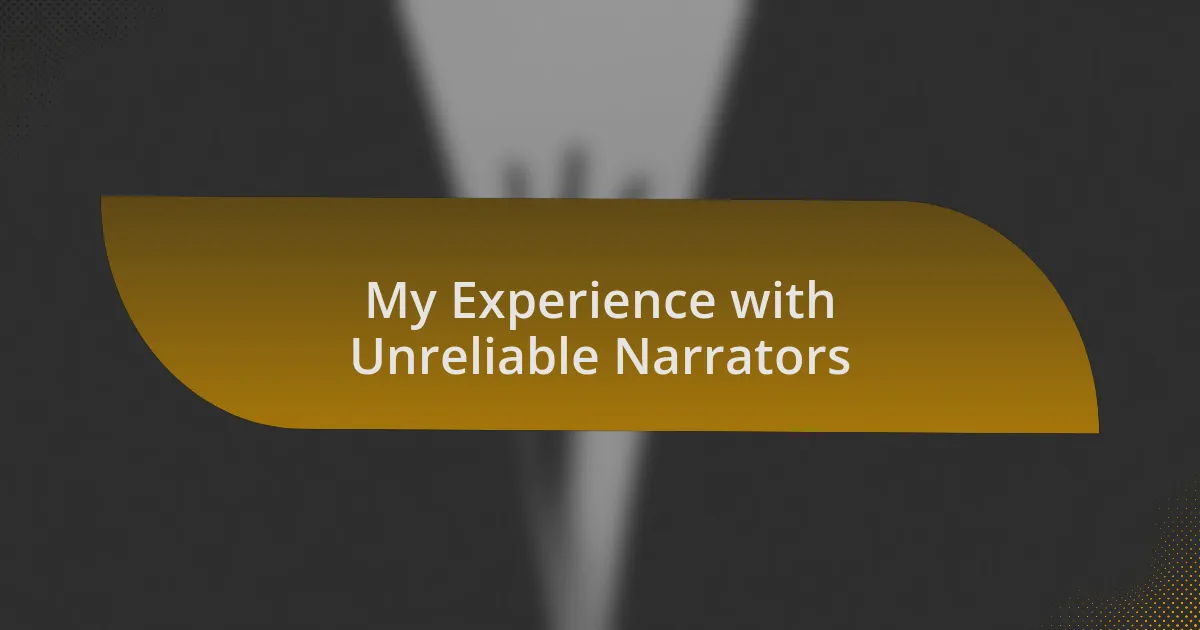Key takeaways:
- Unreliable narrators create tension by distorting reality, prompting viewers to question their perceptions and the truth of the story.
- The motivations behind characters’ actions in horror can evoke sympathy and reflect deeper societal fears, highlighting the thin line between sanity and madness.
- Lessons from unreliable narrators include recognizing our own biases and the complexities of human psychology, often revealing that perceptions can be illusions.
- Recommended horror films like “The Others,” “Shutter Island,” and “Gerald’s Game” effectively explore themes of unreliable narration and psychological depth.
Author: Julian Ashford
Bio: Julian Ashford is a celebrated author known for his gripping thrillers and thought-provoking narratives. With a background in psychology, Julian skillfully weaves intricate plots that explore the complexities of the human mind and morality. His novels have been praised for their compelling characters and unexpected twists, earning him a dedicated readership. When he’s not writing, Julian enjoys hiking and exploring new cultures, often drawing inspiration from his adventures for his storytelling. He currently resides in the picturesque countryside, where he continues to craft stories that captivate and challenge readers.
Understanding unreliable narrators
Unreliable narrators can often distort reality, leaving viewers questioning what’s true and what isn’t. I recall a film where the protagonist’s perspective shifted so dramatically that I found myself second-guessing every scene. How does uncertainty draw us in, intensifying our emotional investment in the story?
The appeal of unreliable narrators lies in their ability to reflect the complexities of human experience. I’ve often related to characters whose motivations and memories are clouded, as it mirrors the confusion we sometimes feel in our own lives. Doesn’t it make you wonder if our perceptions can ever truly be trusted?
In horror films, the use of unreliable narrators adds an exhilarating layer of tension. I vividly remember being mesmerized by a character whose grip on reality slipped further with each twist. It’s a haunting reminder that fear often stems not from what we see on screen, but from the uncertainty of how we interpret the events unfolding before us.
Analyzing character motivations in horror
Analyzing character motivations in horror requires delving into what drives them to make chilling choices. I remember watching a film where the antagonist was motivated by a tragic past, and it made me reflect on how often fear stems from unresolved pain. Isn’t it intriguing to think that a character’s motivations can evoke sympathy, even when they commit horrific acts?
The exploration of these motivations often reveals deeper societal fears and psychological struggles. For example, a character obsessed with revenge can mirror our own grappling with anger or betrayal. I often find myself pondering whether our own dark urges could lead us down a similar path if left unchecked. What does that say about us?
In horror, a character’s motivations can also elicit a sense of uncertainty that amplifies the tension. I recall feeling both excitement and dread as a character made increasingly irrational decisions, underscoring that thin line between sanity and madness. How engaging is it to witness that transformation, knowing that it reflects our own potential for chaos?
Lessons learned from unreliable narrators
The lessons learned from unreliable narrators often center around questioning our perception of truth. I vividly recall a horror film where the protagonist’s grip on reality began to unravel, leading me to wonder about my own biases. How often do we accept a narrative simply because it’s presented convincingly, even if it may not reflect the full picture?
Another takeaway is the power of narrative manipulation in deepening our emotional responses to the story. In one chilling experience, I felt terrified and sympathetic simultaneously as the unreliable narrator unraveled, illustrating how our emotions can be puppeteered. Isn’t it fascinating how our trust can lead us into fear, almost like a dance of shadows that keeps us on edge?
Additionally, unreliable narrators remind us of the complexities of human psychology. I remember gripping the armrest of my chair, feeling utterly confused as the story twisted and turned. This experience taught me that sometimes, what we think we know may be just an illusion—a reflection of our own insecurities and fears. How much of what we believe is shaped by our own unreliable perspectives?
Recommendations for horror film enthusiasts
When it comes to horror films featuring unreliable narrators, I’d recommend diving into “The Others.” The film masterfully plays with perception and creates an unsettling atmosphere. I still remember the twist that left my heart racing, even as the credits rolled—did I really see everything clearly, or was I just as deceived as the characters?
If you’re looking for something that blends horror with psychological depth, “Shutter Island” is a must-watch. I felt a sense of dread building as the protagonist navigated through layers of confusion and revelation. The unsettling realization that reality itself might be a construct kept me questioning everything, making it a haunting experience that resonates long after viewing.
For a more modern take, “Gerald’s Game” effectively utilizes unreliable narration within a confined space. As I watched the protagonist’s struggle against her own mind, I couldn’t help but reflect on my personal vulnerabilities and fears. The film forces you to confront what lurks in the dark corners of your psyche—what are you hiding from yourself?
